Yves here. Even though, as Helmer details, most Russians are feeling stressed about their economic security, the US escalation of its conflict with Russia has not weakened Putin.
By John Helmer, the longest continuously serving foreign correspondent in Russia, and the only western journalist to direct his own bureau independent of single national or commercial ties. Helmer has also been a professor of political science, and an advisor to government heads in Greece, the United States, and Asia. He is the first and only member of a US presidential administration (Jimmy Carter) to establish himself in Russia. Originally published at Dances with Bears
It was a marching song in 1915: “What’s the use of worrying? It never was worthwhile, so Pack up your troubles in your old kit-bag, And smile, smile, smile.” Three more years of war in Europe obliterated the smiles, and also the song.
Under pressure from the US campaigns on the Ukraine and Syrian fronts, in the propaganda media, and on the international capital markets, the Russian home front is marching with dwindling income and growing fear. There is no smiling. But the political impact is stable support for President Vladimir Putin; growing support for ministers regarded as fighting effectively against the foreign enemy; and weakening support for ministers seen to be pro-American, like Prime Minister Dmitry Medvedev. If you invest in the Russian grocery basket, this tune will grow on you.
The London stock market, where four of the top Russian supermarket companies are listed, reveals that since mid-January investor sentiment started to move in a positive direction, buying demand pushing up share price. The chart shows that Dixy, listed on the Moscow exchange, and London-listed O’Key are the exceptions – they have continued to drift around their low points for the year.
ONE-YEAR SHARE PRICE TRAJECTORY FOR RUSSIAN SUPERMARKET STOCKS
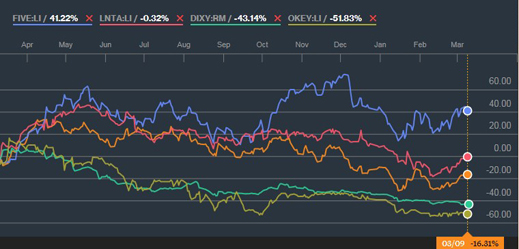
Key: blue=X5; pink = Lenta; yellow = Magnit; grey = Dixy; green = O’Key
Share price gainers, losers, on the year: X5, +37.6%; Lenta, -2.4%; Magnit, -8.5%; Dixy, -43.2%; O’Key, -50%.
Source: http://www.bloomberg.com/quote/MGNT:LI
Russian military victory on the Syrian front, the collapse of the US regime in Kiev, and signs of regimes toppling in Berlin, Paris, Brussels and London have helped support the growing market conviction that the damage to Russian capital value has hit bottom. Rising crude oil and commodity prices are also contributing to the positive momentum. Still, the damage to the market capitalization of the Russian retail sector has been costly.
US WAR IMPACT ON MARKET CAPITALIZATION FOR TOP-4 LISTED RUSSIAN RETAILERS
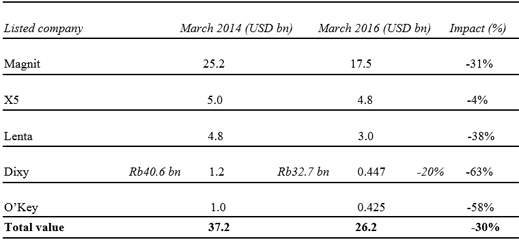
At home, Russians are pessimistic. According to the latest nationwide opinion polls, the fear of a breakdown of the government’s social welfare system is rising faster now than the deterioration in the payments situation itself. The priority concerns have changed dramatically.
HOW RUSSIAN PRIORITIES HAVE CHANGED IN THE LAST 16 YEARS OF VLADIMIR PUTIN’S PRESIDENCY
January 2016
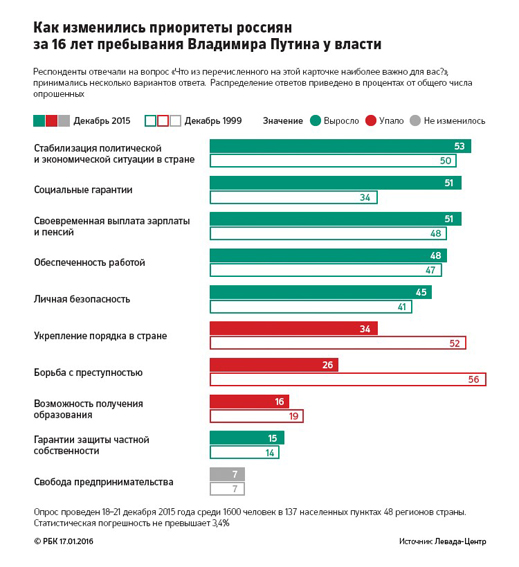
Key: 1st row – political and economic stability in the country; 2nd row – social guarantees; 5th row – law and order in the country; 6th row – fight with crime; 7th row – opportunity for education
January 18, 2016.
Source: http://www.levada.ru/2016/01/18/zapros-na-silnuyu-ruku-perestal-byt-prioritetom-dlya-rossiyan/
The concern for stability remains unchanged, but fear for the welfare system is suddenly much greater – compared to 1999 – than law and order, terrorism, and personal security. Most Russians believe this is Putin’s achievement on law and order and economic stability. The new threat is blamed entirely on the foreign enemy. The domestic opposition’s catch cry of corruption is also the national consensus, but no opposition figure is trusted to be capable of doing something about it.
What is happening to salaries, pensions, child welfare, and student scholarship payments is genuine reason for the public concern. According to the latest report from the state statistics agency Rosstat, total wage arrears in Russia increased by 21.3% by the start of February compared with the start of January. At a total of Rb4.3 billion the aggregate is almost double the level reported a year earlier.
12-MONTH TREND IN WAGE ARREARS
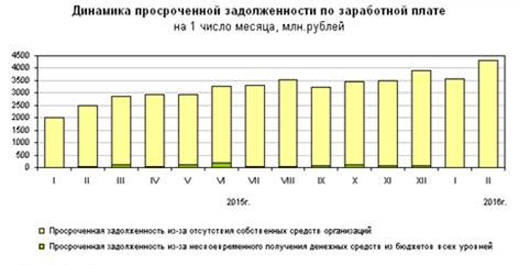
Key: yellow = lateness or lack of enterprise funds; green = lateness from federal, regional and other state budgets
Source: http://www.gks.ru/bgd/free/B04_03/IssWWW.exe/Stg/d06/27.htm
Some regions are significantly worse than others; this appears to reflect the diversion by local officials of federal flows of budget funds into the payment of non-salary, non-employee debts and obligations at the regional level. Still, experts following the situation report that the federal government has plenty of cash still in reserve so that overall, state employees will get their wages steadily, although without indexation. Compared to the earlier crisis periods of 1998 and 2008, the state wage payment system is more transparent and better protected against diversion and fraud.
There are rumours among the elderly and the most vulnerable. Local and regional media are reporting that pension payments have been delayed, though the delays appear to be no more 3 to 7 days. The reasons differ from place to place. The elderly remember what President Boris Yelstin did to their pensions, welfare benefits, and their savings. Apprehension that the Yeltsin-period problems may recur, and suspicion that the US Government is trying to achieve this, as it did 25 years ago, are greatest among Russians over 60 years old.
There is also apprehension among the young. A survey of regional press reports shows that child benefit payment delays have been occurring in Murmansk, Chita, Chelyabinsk, even St. Petersburg. The benefit affected is the payment owed to mothers with large families – more than three children. The delays have been frequent enough, and the complaints numerous and loud enough, for the Duma Committee on Family, Women and children to announce a formal investigation. The chairman of the committee, Yelena Mizulina, has publicly called for the investigation and for a prompt remedy for the problem. Mizulina’s motherland credentials are solid, not least of all because she has been castigated in the American press and is on the US sanctions list. For more on the reason Mizulina has been sanctioned, read this.
In Irkutsk, Novosibirsk and other regions university students have been protesting at delays in receiving their monthly stipends. The financial fault appears to be in the federal ministries or regional administrations in charge of outlays for special vocational education such as agriculture colleges, medical schools, and institutions for the performing arts. In parallel, there are also delays in paying teachers whose money comes from the budgets of these ministries.
The State Duma goes to election on September 18. Because that date makes this a campaign year, the Kremlin wants to avoid localized protests spreading, generating waves of sympathy protests at the federal level. How this can happen is evident from the way in which the trucker protest at the imposition of the Platon toll has attracted national attention. According to the poll by the Levada Centre in Moscow, taken between December 4 and 8, half the country is familiar with the issue. Do Russian voters recognize the toll as one collected by the Rotenberg family was not a question Levada asked, though Putin himself, at his December 17 national press conference, was forced to address the point directly. “All revenues coming from the Platon system”, Putin said, “all 100 percent – do not go into somebody’s pocket.” The somebody the audience believed, and Putin felt obliged to deny, was “[Boris] Rotenberg Jr…It is important to get to the bottom of the problem, not try to use a difficult situation for some quasi-political purposes…”
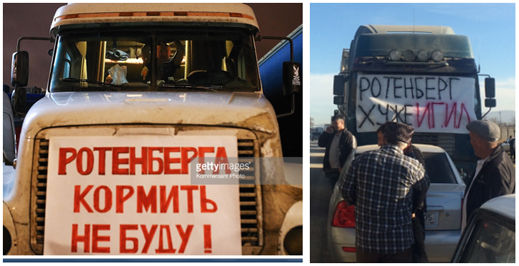
Putin was straining for credibility, as the Levada polling now shows. Here, for example, is Levada’s measurement of the extent of national support for the truckers:
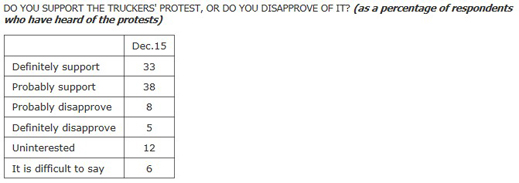
December 17, 2015; Source: http://www.levada.ru/eng/truck-drivers%E2%80%99-protest
As Putin recognizes, there is a danger that mounting hostility among voters might reach a mass infectious point at the parliamentary elections. The public opinion polls show a sharp nationwide rise in apprehension of a failure in the social guarantee payments system. However, at the same time the political leadership is not blamed for this. Protests are localized; this means the targets of the protesters are local company bosses, institutional officials, and regional administrators. In the truckers’ protest, for instance, Putin’s friends, the Rotenbergs, draw the blame, but not Putin — not even when he publicly defends them. For more on the Rotenbergs, read this archive.
There has been a 3-point dip in Putin’s approval rating from 85% in December to 82% in January, according to the Levada measurement.
RUSSIAN APPROVAL OF PRESIDENT PUTIN’S PERFORMANCE
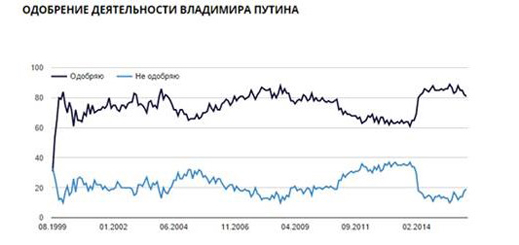
Key: dark blue = approve; light blue = disapprove
Source: http://www.levada.ru/indikatory/odobrenie-organov-vlasti/
No political head in Europe or the US has secured such a high, and also stable approval rating for as long as Putin has done. Under the pressure of events since the start of 2014, the only European politician with a comparable lift in domestic support, Chancellor Angela Merkel, has lost the confidence of most German voters; her rating has collapsed; and she is now in far greater danger of being overthrown in a palace coup than the Russian leadership.
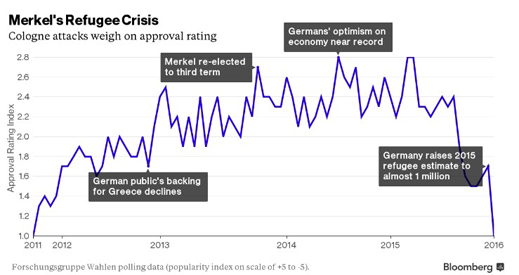
This isn’t an American-type Teflon effect for the Russian president. It is not that the negative news and corruption scandals wash off Putin. It is that the war is viewed by Russians as aimed directly against them; and that in the circumstances there is no one else as capable as Putin for defending the Russians. It’s a kind of Winston Churchill effect – except there are multiple Adolf Hitlers now threatening Russia outside the country’s frontiers — and no Clement Atlee alternatives inside.
The US war is also transforming the political rankings below the president. In the list of politicians most trusted at the moment by the voters, Putin has come first with 55% to 58%; the Defense Minister Sergei Shoigu runs second with a stable 26%; the Foreign Minister Sergei Lavrov is third with a rising 20%; and Medvedev, fourth with 16% to 18%. The rankings reflect the frequency with which, on the war fronts, Shoigu and Lavrov are seen on television, and also the cogency and credibility of what they say. In the poll record, no Russian foreign minister has bested the prime minister ever before. For Lavrov himself, there has never been such a positive public endorsement.
RUSSIANS EXPRESS TRUST IN POLITICAL LEADERS
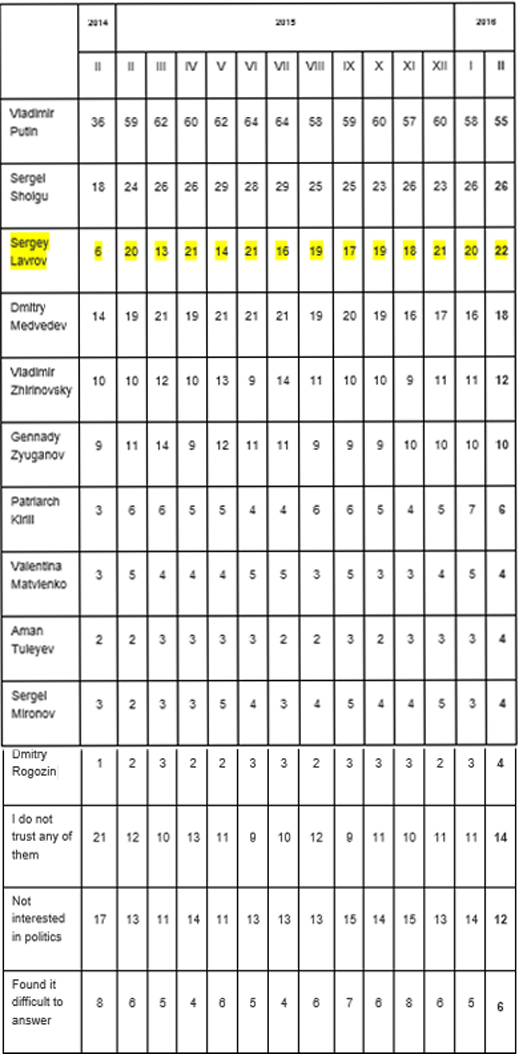
February 2016; source: http://www.levada.ru/2016/02/26/fevralskie-rejtingi-odobreniya-i-doveriya-5/
The political opinion polling demonstrates the way in which the perception of foreign threats is reinforcing support for Putin and his leading subordinates. It is also showing the fallacy in the theory of the Obama Administration that isolating and sanctioning Putin “cronies”, like the Rotenbergs, would arouse Russian resentment against them, and turn against Putin himself.
The stock market assessment of the retail sector, or to be more precise Fast Moving Consumer Goods (FCMG), provides a parallel glimpse of how Russians are responding to the wartime pressure on their pockets and standard of living; and why this is not going the way the Washington regime plotted. On the one hand, the war since February 2014 has done grave damage to the market capitalization of the listed Russian companies. On the other hand, the financial reports for 2015 show continuing growth in revenues, as well gains in the FMCG market share, not at each other’s expense, but at the expense of smaller retailers. Magnit continues to lead in revenues and market share, followed by X5, then Lenta, Dixy, and O’Key.
THE TOP RUSSIAN RETAILERS IN 2015
Market share in percent, revenues in billion roubles
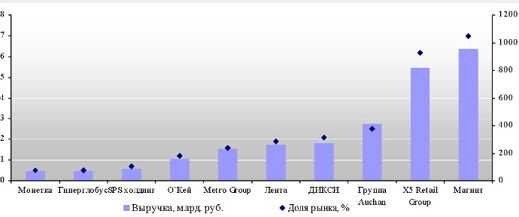
Source: http://www.marketch.ru/marketing_marginalia/obzor_rynka_fmcg_po_itogam_2015_goda/
For a comparison of how this market looked a year ago, when the foreign supermarket companies appeared more likely to benefit than the domestic leaders, read this.
Analysts of the sector at the Moscow investment houses say five factors explain last year’s growth, and this year’s share price pickup, itself driven by continuing growth forecasts for sales in 2016. The first two drivers are inflation in the price of food, and multiplication of the number of stores and area of selling space. Together, they have driven revenue growth for 2015, over 2014, of 24.5% for Magnit; 27.3% for X5; 30.3% for Lenta; and 18.9% for Dixy.
O’Key, the fifth of the stock-listed Russian supermarket groups, has reported revenue growth last year of just 6.9%. Its revenue total came to Rb160.3 billion Its market cap is currently $425.1 million. The share price has fallen by 59% over the past year.
ONE-YEAR SHARE PRICE TRAJECTORY FOR O’KEY
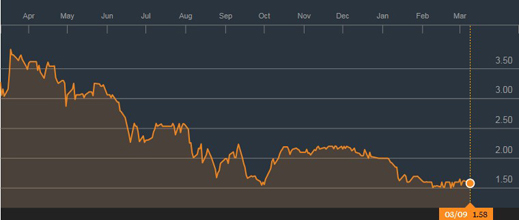
Source: http://www.bloomberg.com/quote/OKEY:LI
According to the Moscow sector analysts, three other factors have helped the top-5 compete more effectively, as well as profitably, with both the large foreign supermarket companies like Auchan and Metro, and also the smaller domestic operators. Discounting with special product promotions is a typical tactic for supermarkets to push sales volume; so is cut-price “own brand” merchandising. The analysts also say that as real income falls, Russian consumers are adapting by changing what’s in their baskets at the checkout. Fresh foodstuffs are being passed over in favour of processed goods, such as canned fruits, frozen vegetables, bottled sauces, and sausages instead of meat.
This Levada poll taken in mid-January reveals there is more sustainable demand for basic consumption spending among Russian consumers than there was in the previous crisis years of 1998 and 2008.
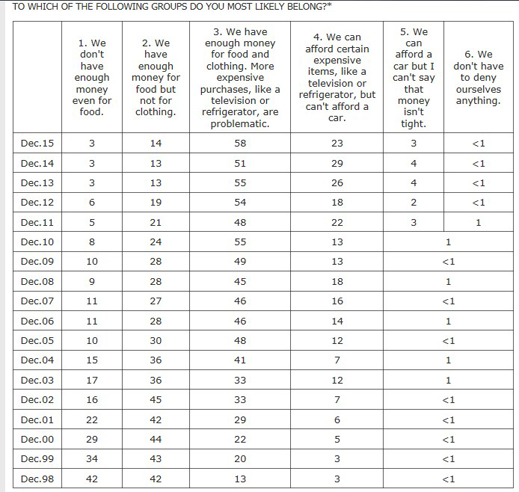
Source: Levada Center, Moscow, January 20, 2016
Natalia Kolupaeva, an analyst at Raiffeisen Bank in Moscow, reports “falling consumer income has had a negative impact on the dynamics of the consumer basket. It has become cheaper. But at the same time, due to the high inflation caused by the devaluation of the rouble, sanctions and a number of other reasons, together with the opening of new stores, compensates the retailers for the loss.” The expansion of stores and the revenue growth must “slow down gradually, due to the base effect. The networks cannot grow indefinitely. At some point, the retailers start to optimize their plans as saturation of the market approaches.”
She and other analysts are forecasting continued growth of sales revenues this year. Still, Kolupaeva believes there is a smaller cushion of personal savings for Russians to fall back on today than they had during the 2008 crisis. She and most analysts also believe the current crisis may be longer lived. So there must come a crunch in consumer confidence if the crisis continues. It just won’t be this year.


I looked up the Defense Minister Sergei Shoigu. The man is an engineer that has led thousands of men since his twenties, speaks nine languages and hangs out in a yurt in Siberia for fun. The likely next POTUS, Hillary Clinton doesn’t even manage to lie credibly, and that seems to be her primary skill. It’s no wonder the US is losing against Russia.
Anyway, if there is a demand crisis, Putin may use it as an opportunity to purge Medvedev and other Atlanticist Integrationists, allowing him to monetize the deficits using the Central Bank. His strategy in Crimea, Chechnya and other places has been to allow a crisis to hit the the breaking point before a decisive intervention.
Please don’t refer to Hillary as the next POTUS. Even the thought makes me want to vomit.
I second that!
Bernie keeps getting stronger, and his chance of success is stronger in the states yet to primary. i think also the Trump ruckus in Chicago will help to wake people up to what they have to lose if they vote for SHillary. I’m hopeful!
Seems like a reasonable enough proposition: the problem for Western propagandists in MSM is Putin made public his arguments, his evidence, the international legal principles involved and on and on. He considers precedent, he minds if a deal is unfair for Russia, history counts, etc.
i didn’t think of medvedev as a pro-american lackey but more of a putin sidekick, part of a putin-medvedev-lavrov russian triumvirate.
but then, triumvirates do have a pattern of falling apart.
According to Unz, Medvedev is a threat to Putin.
http://www.unz.com/tsaker/putins-biggest-failure/
Hey it’s about time someone started referring to the Obama administration as “the regime.” The press love this buzzword which implies illegitimacy and use it for people they don’t like such as Assad. To be sure the American people in their wisdom did elect Obama, but given the duopoly and MSM groupthink our presidential choices are often nearly as constrained as in Russia–at least when it comes to foreign policy.
One major reason why sanctions likely aren’t hurting Russia all that much (or at least to the degree that neo-cons fantasized they would) is that their economy isn’t as highly leveraged and financialized as the west, making it more resilient than our fragile version of crony capitalism.
The pensions are something to watch but I suspect European and US pension systems will implode soon due to ZIRP/NIRP.
The growth of corporate/cleptocrat food retailing at the expense of smaller local businesses shows the NeoLiberal yoke affixed under Yeltsen isn’t yet loosened. Russia with its corruption still has the same ketosis problem the US has with our cleptocracy: both societies are being forced to eat their own bodily protein so the corpretulent can keep their body fat.
The pressure of war at the border is forcing Putin into a position where to survive he will need to act against his oligarchs. If we get Bernie, we may beat him to the punch and take on ours, otherwise he has the stronger cards as he already understands how collapse works and we’re just tasting ours.
How does this interact with Russia’s commitment to rebuild its internal productive capacity that was outlined by Sergey Glazyev? Glazyev lays out situations as bluntly as Lawrence Wilkerson does here, and Putin is superb at framing the us v them for the population. Continued sanctions help Putin internally, but I can’t untangle the currency and finance aspects.
A specific question would be the effects of and on western markets based on concerns of dumping the losses in favor of alternative financial arrangements.